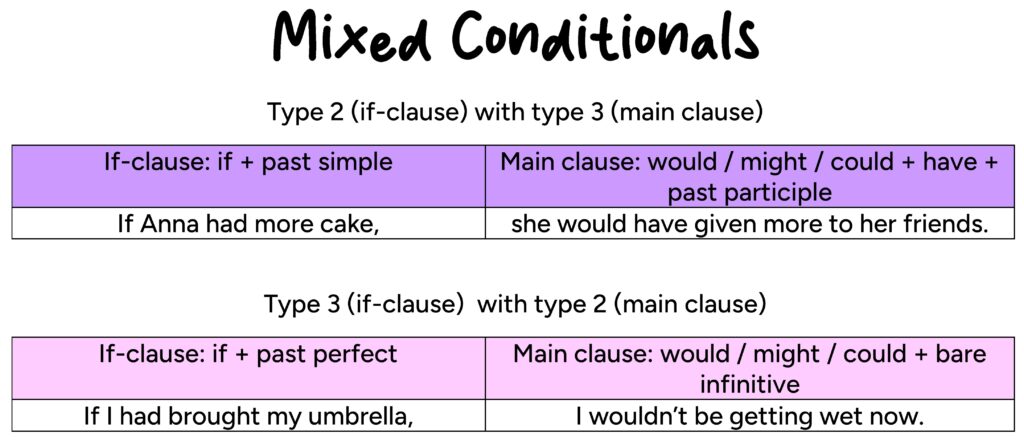What are conditionals in English?
We use conditionals in English to express a condition and its probable outcome; they are related to each other.
They consist of two parts: the if-clause and the main clause.
If you get caught, you will be in trouble.
When the if-clause comes first, we need a comma to separate it from the main clause. But, when the main clause comes first, we do not need a comma.
4 types of conditionals
What is the zero conditional?
We use the zero conditional to express general truths that are always real and scientific facts where the condition is certain to happen.
| If-clause: if / when + present simple | Main clause: present simple |
| If you touch boiling water, | you get burned |
More examples of zero conditionals
If you mix water with oil, an emulsion occurs.
If you drink water, you don’t feel thirsty.
You get pink if you mix red and white.
What is the first conditional?
We use the first conditional to express possible events in the present or future.
| If-clause: if + present simple | Main clause: future simple (will) / modal verbs ( can, may, might, should, could, must) + bare infinitive |
| If I go to Japan, | I will bring you souvenirs |
More examples of first conditionals
If it is really expensive, we won’t buy it.
They might get in trouble if they argue in the company.
If you don’t read about the topic, you won’t understand the class.
What is the second conditional?
We use the second conditional to express an unreal event that is not certain to happen in the present or future.
| If-clause: if + past simple / past continuous | Main clause: would / might / could + bare infinitive |
| If I had more time, | I would attend the event |
Note: when using the past tense of the verb ‘to be’, was is recommended for only singular subjects and were can be used for all persons (including singular and plural subjects).
More examples of second conditionals
She could send the presents if you gave her the direction.
If I were rich, I would buy many cars.
If you paid me more, I would do a much better job.
What is the third conditional?
We use the third conditional to express an unreal event in the past and their imagined result.
| If-clause: if + past perfect | Main clause: would / might / could + have + past participle |
| If I had trained harder, | I would have won |
More examples of third conditionals
I could have come if you had called me.
If he had explained them the situation, they would have understood.
She would have felt better if you had hugged her.

What are mixed conditionals?
Mixed conditionals involve the combination of the different types of conditionals, such as:
Type 2 (if-clause) with type 3 (main clause)
| If clause: if + past simple | Main clause: would / might / could + have + past participle |
| If Anna had more cake, | she would have given more to her friends |
More examples
We would have continued running if we had more energy.
If the hotel had better service, we could have recommended it.
If he weren’t allergic to nuts, he would have eaten some.
Type 3 (if-clause) with type 2 (main clause)
| If-clause: if + past perfect | Main clause: would / might / could + bare infinitive |
| If I had brought my umbrella, | I wouldn’t be getting wet now |
More examples
If Mario had taken the job offer, he would be working in a better company.
I would practice the guitar everyday If I had bought one.
If she had passed the semester, she would be happy now.

Read more about English grammar here.